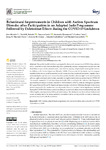Mostrar o rexistro simple do ítem
Behavioural Improvements in Children with Autism Spectrum Disorder after Participation in an Adapted Judo Programme Followed by Deleterious Effects during the COVID-19 Lockdown
| dc.contributor.author | Morales, José | |
| dc.contributor.author | Fukuda, David H. | |
| dc.contributor.author | García, Vanessa | |
| dc.contributor.author | Pierantozzi, Emanuela | |
| dc.contributor.author | Curto, Cristina | |
| dc.contributor.author | Martínez-Ferrer, Josep O. | |
| dc.contributor.author | Gómez, Antonia M. | |
| dc.contributor.author | Carballeira, Eduardo | |
| dc.contributor.author | Guerra-Balic, Myriam | |
| dc.date.accessioned | 2021-09-28T07:42:59Z | |
| dc.date.available | 2021-09-28T07:42:59Z | |
| dc.date.issued | 2021-08-12 | |
| dc.identifier.citation | Morales, J.; Fukuda, D.H.; Garcia, V.; Pierantozzi, E.; Curto, C.; Martínez-Ferrer, J.O.; Gómez, A.M.; Carballeira, E.; Guerra-Balic, M. Behavioural Improvements in Children with Autism Spectrum Disorder after Participation in an Adapted Judo Programme Followed by Deleterious Effects during the COVID-19 Lockdown. Int. J. Environ. Res. Public Health 2021, 18, 8515. https://doi.org/10.3390/ijerph18168515 | es_ES |
| dc.identifier.issn | 1661-7827 | |
| dc.identifier.uri | http://hdl.handle.net/2183/28521 | |
| dc.description.abstract | [Abstract] The public health lockdown prompted by the novel coronavirus (COVID-19) pandemic, which included school closures that may have potentially serious consequences for people with disabilities or special educational needs, disrupted an ongoing adapted judo training intervention in children with Autism Spectrum Disorder (ASD). The purpose of this study was to compare repetitive behaviours, social interaction, social communication, emotional responses, cognitive style and maladaptive speech scores across four time-points: baseline, after an eight-week control period, after an eight-week judo intervention and after an eight-week lockdown period due to COVID-19. The sample consisted of 11 children diagnosed with ASD according to the criteria of the Diagnostic and Statistical Manual of Mental Disorders—Fifth Edition (DSM-V), with an intelligence quotient (IQ) range between 60 and 70. Significant improvements were shown following the judo intervention period compared to the baseline and control periods. However, the same values significantly declined during the COVID-19 lockdown period resulting in values lower than those recorded at baseline, and following the control period and the judo intervention. The decline in psychosocial and behavioural scores are likely due to the stress caused by the sudden halt in activity and the increase in sedentary practices associated with the lockdown. | es_ES |
| dc.description.sponsorship | This study has been partially funded by a Ramon Llull University grant (ref. CER-URL-2019) and Erasmus+ Sport Programme (Project Identifier: 612954-EPP-1-2019-1-ES-SPO-SCP) | es_ES |
| dc.description.sponsorship | Universitat Ramón Llul; CER-URL2019 | |
| dc.language.iso | eng | es_ES |
| dc.publisher | MDPI | es_ES |
| dc.relation.uri | https://doi.org/10.3390/ijerph18168515 | es_ES |
| dc.rights | Atribución 4.0 Internacional (CC BY 4.0) | es_ES |
| dc.rights.uri | https://creativecommons.org/licenses/by/4.0/ | * |
| dc.subject | Autism | es_ES |
| dc.subject | Adapted judo progamme | es_ES |
| dc.subject | Exercise intervention | es_ES |
| dc.subject | Physical activity | es_ES |
| dc.subject | COVID-19 | es_ES |
| dc.subject | Lockdown | es_ES |
| dc.subject | GARS | es_ES |
| dc.title | Behavioural Improvements in Children with Autism Spectrum Disorder after Participation in an Adapted Judo Programme Followed by Deleterious Effects during the COVID-19 Lockdown | es_ES |
| dc.type | info:eu-repo/semantics/article | es_ES |
| dc.rights.access | info:eu-repo/semantics/openAccess | es_ES |
| UDC.journalTitle | International Journal of Environmental Research and Public Health | es_ES |
| UDC.volume | 18 | es_ES |
| UDC.issue | 16 | es_ES |
| UDC.startPage | 8515 | es_ES |
Ficheiros no ítem
Este ítem aparece na(s) seguinte(s) colección(s)
-
GI-GIGG - Artigos [111]






